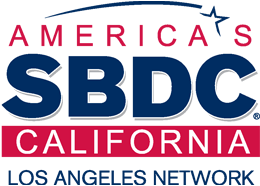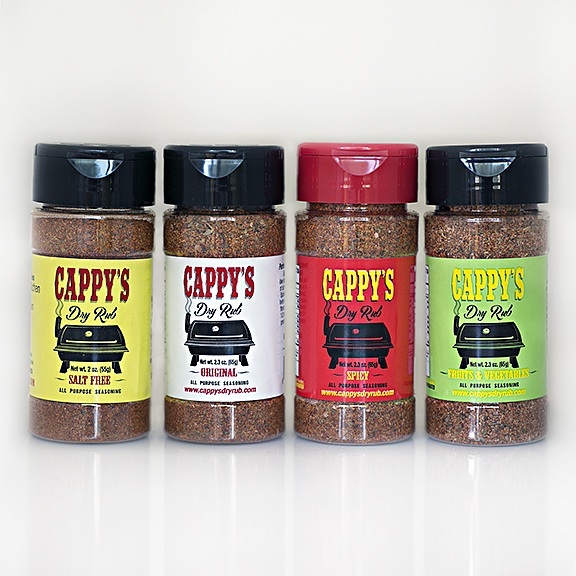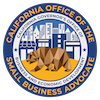Launched in 2013, Cappy’s Dry Rub sells a line of all natural dry spice rubs which can be used on a wide variety of foods including meat, fish, vegetables, and fruits. A recipe created by the company’s co-founder, Cappy’s has grown rapidly in a short time.
Challenges
After years working as an executive in the transportation industry and then owning a check-cashing business, Herbert “Gene” Holman grew restless in retirement. For decades, he had made spice rubs that friends and family raved about. Holman and his wife, Paulette, who had spent 30 years as a costume designer in the movie industry, decided to try making the spice rubs into a business.
The couple had previously started a small-scale business making bottle cozies out of used men’s shirts and selling them at farmers’ markets. The couple worked with Ben Tenn at the Small Business Development Center hosted by the College of the Canyons. They determined that the bottle-cozy concept wasn’t viable on a larger scale. In March 2013, the Holmans headed back to the SBDC to get Tenn’s input on their spice rub business idea.
Best Advice
The Holmans had done preliminary testing; they gave samples of the rub to family, friends and members of their church. “The response was overwhelming,” Gene recalls. When Tenn tried the product, he was sold, too. Working one-on-one with Tenn and taking a QuickBooks course at the SBDC, the couple learned how to navigate a new industry, manufacture cost-effectively, find new markets and distribution channels, set up a business website, expand their product line and manage growth.
Changing Course
The couple initially sold Cappy’s Dry Rub at farmers’ markets, but soon realized the limitations of this approach. “We were doing five farmers’ markets a week, and we were exhausted!” Gene recalls. After discussion with Tenn, the Holmans scrapped their initial plan to expand to more farmers’ markets, and began targeting supermarkets and other retailers as customers.
After they obtained a county license enabling them to wholesale and retail both locally and nationally, Tenn helped them pinpoint possible customers. He also advised them on presenting themselves and their product to buyers. “[Ben showed us] how to relate to the customers,” Paulette says. “We learned their needs and how to help them, and talked about how they can use the product.”
Convenience is a key selling point for Cappy’s Dry Rub—it can be used on everything from meat and seafood to vegetables and even fruit. Because it’s healthy, with no gluten, sugar or MSG, the Holmans were able to target organic, vegetarian and gourmet markets as well as traditional supermarkets. “We started calling people and trying to get our product to them to sample,” says Gene. “In most cases, they would order a few cases.”
Learning the Ropes
Initially, the Holmans manufactured Cappy’s Dry Rub under cottage law, a California law that allows the manufacture of non-perishables in a home. However, in order to wholesale the product to retailers they had to ramp up production and cut costs. They turned to Tenn for help and about a year after startup, the Holmans moved into a commercial kitchen.
The change has transformed their business. “At home, I would make 80 or 90 bottles a day by hand,” Gene says. “The commercial kitchen can handle 80 pounds of product at once, so I can make 500 or 600 bottles in the same amount of time.”
Understanding Finance
Gene had been keeping the company’s books on ledgers, but Tenn encouraged him to transition to QuickBooks accounting software. After taking a QuickBooks class offered by the SBDC in July 2014, Gene began converting the business’s financial data over to QuickBooks. “This will help us tremendously with controlling costs and analyzing the business,” he says.
Tenn has helped with other financial issues, too. “He showed us the cost ratios we should be looking at, [how to] control the cost of goods and what’s realistic in terms of pricing,” Gene says.
Sourcing Suggestions
Carefully sourcing materials has been a huge factor in the company’s success. “Ben talked to us a lot about cost of goods and different ways to keep reducing it,” Gene says. At first, the Holmans bought spices at near-retail prices. Tenn advised them to switch to a wholesale restaurant supply store, reducing costs greatly. Today, they have slashed costs even further—“30 or 40 percent,” Gene says–by cutting out the middleman and buying in bulk direct from spice suppliers.
The couple was also buying bottles from a company back East. “Ben started analyzing the cost per bottle, cost per cap and how much we were paying for shipping,” Gene recalls. “We were spending 20 to 30 percent of our costs on shipping!” Tenn helped them find a local supplier that not only sold bottles and caps for less, but let them pick up orders in person, eliminating shipping costs.
Client Impact
Since launching Cappy’s Dry Rub with one product in April 2013, the Holmans have added three more rubs to the line—a salt-free version suggested by Tenn, a spicy rub and a rub for vegetables and fruits. Their products are carried in 19 Southern California markets on the company’s website and on Amazon.
Gene and Paulette still visit one farmers market regularly to interact with customers and get feedback. “Ben told us to keep our ears open, listen to what customers are saying about our products and use that as a resource,” Gene says. They continually fine-tune their products—“everything from labeling to flavors to approach”—based on customer suggestions.
The Holmans’ next step is hiring employees to handle day-to-day operations, such as running the website and demonstrating the product in stores, so they can focus on marketing and distribution. They are talking to Tenn about options for larger-scale manufacturing, such as opening their own plant or using a co-packer. Ultimately, they’d like to expand nationwide and even globally.
“Ben has been a great person to bounce our ideas off and tell us whether we’re going in the right direction,” says Gene. “Every time we see him, we leave overwhelmed with new ideas, excited and so inspired,” says Paulette.
“He [our advisor] showed us the cost ratios we should be looking at, how to control the cost of goods and what’s realistic in terms of pricing.” –Herbert “Gene” Holman, Co-founder, Cappy’s Dry Rub






